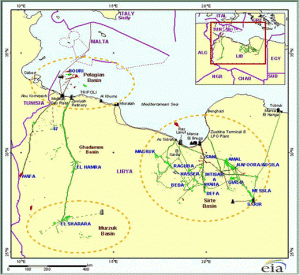By Sami Zaptia.

London, 4 July 2016:
Libya’s rival National Oil Corporations (NOC) have agreed to reunify the corporation and resume oil exports. The announcement followed on from a meeting between the two rival NOC chairmen in Ankara, the Turkish capital on Saturday.
The announcement says that Tripoli’s NOC head, Mustafa Sanalla is to become chairman while Beida’s head Naji Maghrabi would become a member of the board. In return, the NOC headquarters would be returned to its pre-Qaddafi era location in Benghazi.
The agreement also recognizes the legitimacy of the House of Representatives as the only legislature in Libya and the Presidency Council/GNA as the only executive in the country. The unified body will send periodic reports to both bodies.
The two sides also jointly agreed a unified budget for the remainder of the current financial year, and took steps to address any imbalances resulting from the period of division. The agreement makes infrastructure rehabilitation a priority, especially in the city of Benghazi in preparation for the relocation of NOC’s new headquarters, it said.
The parties expressed a strong desire that the NOC board should meet regularly in Benghazi in the interim if security conditions permit.
“There is only one NOC, and it serves all Libyans,” said Sanalla. “This agreement will send a very strong signal to the Libyan people and to the international community that the Presidency Council is able to deliver consensus and reconciliation. I’m sure it will now build on this success to bring unity and stability to other government institutions.”, he added.
“We made a strategic choice to put our divisions behind us and to unify and integrate NOC as directed by the House of Representatives and the Chairman and Members of the Presidency Council,” said Maghrabi. “There is no other way forward. This is for the good of Libya.”
Speaking to Libya’s Channel TV, Maghrabi said that the agreement is based on several pillars, the most important of which is working with the HoR. He said that the east could not work with any government that has not been approved by the HoR. The agreement would not be effective unless the HQ is transferred to Benghazi, adding that holding periodic meetings in Benghazi would not be enough.
The HoR Energy Committee head, Issa Arebi speaking on the same channel, confirmed the above, including the equitable distribution of oil revenues.
Whilst the technocrat heads of the rival NOCs might have agreed to reunification, in reality, it could be more complicated than that. On one primary level, it is clear that for the process to become effective, wider political consensus between the Faiez Serraj-led Presidency Council/Government of National Accord (PC/GNA) and the House of Representatives is needed.
The UN-brokered 2015 Libyan Political Agreement (LPA) signed in Skhirat, Morocco recognizes the HoR as the sole legitimate legislature and the PC/GNA as the sole executive, however, differences between the two bodies are still preventing an effective implementation of the LPA.
The biggest impediment is the position of Khalifa Hafter who is heading the Libyan National Army (LNA) based mainly in the east and Zintan. Whilst the HoR has approved the LPA in principle, they have objected to article 8 which reverts all heads of major sovereign positions back to it, including the head of the LNA’s position, Hafter.
The east and the HoR object to the removal of Hafter at the expense of what they consider as the Islamist-Misrata coalition in Tripoli – which they blame for toppling the HoR and legitimacy in the Tripoli militia coup of 2014. The east and the HoR have therefore, refused to approve the Faiez Serraj-led GNA, objecting to its Islamist dominance.
They also disapprove of the fact that the PC/GNA are propped up by militias in Tripoli, rather than the formation of a unified tribal/regional-free army which would include Libyans from all the contending sides.
On another level, about two-thirds of Libya’s oil production comes from the Sirte Basin where militia strongman and regional Petroleum Facilities Guard (PFG) head Ibrahim Jadhran and his Magharba tribe are located. Jadhran has switching sides between Tripoli and Tobruk/Beida. He has his own demands once there is a single Libyan political entity he can bargain with for personal and regional concessions.
Equally, in the west, pipelines from the Wafa gas field and from the Sharara oilfields in the deep south west of Libya have to pass through the Western-Nefusa mountains where Zintan exert a strong regional influence. They too would want a settlement that would make up for being ejected by the Misrata-led militias from Tripoli in 2014.
In short, for Libya to be able to increase oil production and exports, an effective political settlement between all the contending power centres has to be reached, over and beyond the rival technocratic heads of the NOC and the HoR and PC/GNA.
However, in the short term, the agreement of the two NOC heads may at least form the foundations for agreements higher up complex political .







